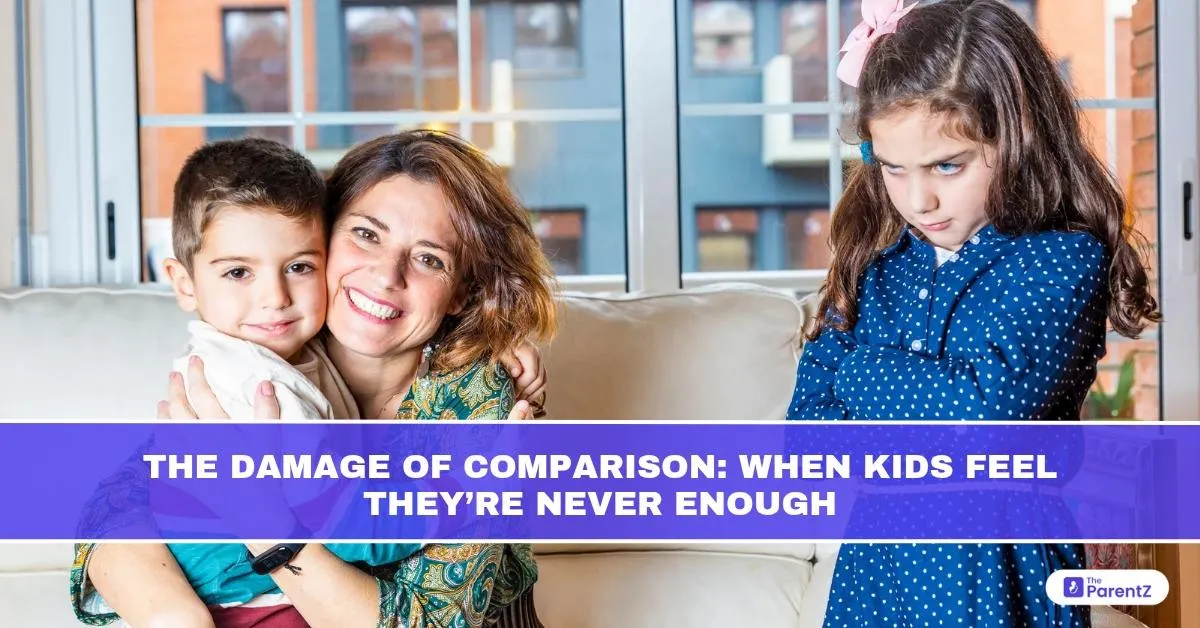A Common Parenting Habit With Lasting Effects
“You should learn from your cousin, she always scores full marks.”
“Look at how nicely he behaves. Why can’t you be like him?”
These words may seem like harmless motivation, but to a child, repeated comparisons feel like rejection. Many parents believe that comparing children will push them to improve. In reality, it often does the opposite. It creates a painful belief deep within: I’m not good enough the way I am.
Why Children Take Comparisons Personally
Children don’t just hear the comparison; they internalize it. When a child hears that someone else is better, faster, smarter, or more obedient, they don’t feel encouraged; they feel small. They begin to question their own worth and may start believing that love and approval are conditional, based on performance or perfection.
This constant pressure slowly chips away at self-esteem. Instead of growing with a sense of confidence and individuality, the child learns to view themselves through the lens of inadequacy.
The Emotional and Psychological Impact
1. Low Self-Worth:
When children feel they’re never “as good” as someone else, they start doubting their abilities and value. Over time, this can result in feelings of inferiority and helplessness.
2. Anxiety and Fear of Failure:
Comparisons make children believe that love and respect come only with achievement. This can create deep anxiety, where failure isn’t seen as a lesson but as a personal flaw.
3. Sibling Rivalry:
When siblings are compared, “She always listens, but you don’t”, it creates unhealthy competition and resentment. One child feels overlooked, while the other carries the burden of being the “better” one.
4. Loss of Identity:
Constant comparisons push children to mold themselves into someone else’s image, instead of discovering who they truly are. Their unique strengths often go unnoticed and undeveloped.
Why Parents Do It and What to Watch For
Most parents don’t compare their children to hurt them. Often, it comes from a place of worry or cultural conditioning. You may want your child to work harder, behave better, or be successful. But using another child as a yardstick backfires because it focuses more on shame than support.
Common phrases to avoid include:
- “Everyone else has finished, why are you so slow?”
- “Your brother never gives us trouble.”
- “Look how thin she is; stop eating so much.” These comments may seem casual at the moment, but they leave lasting emotional impressions.
What to Do Instead
1. Focus on Individual Progress:
Compare your child only to who they were yesterday. Celebrate small improvements. For example, “You finished your homework faster than last week, well done!” This builds internal motivation.
2. Praise Effort, Not Outcome:
Instead of saying, “You didn’t come first,” say, “I saw how hard you worked; that matters more than a rank.” Children need to feel valued for their effort and intention, not just for results.
3. Highlight Their Unique Strengths:
Every child has their own talents. Some are academically inclined, others are emotionally intelligent, artistic, or athletic. Notice and nurture what makes your child special, even if it’s different from others.
4. Create a Safe Space for Expression:
Let your child share how they feel about pressure and expectations. If they say, “You always like my sister more,” don’t dismiss it. Listen, reflect, and reassure them of your unconditional love.
Final Takeaway: Your Child Is Not a Project, They’re a Person
Comparison is the thief of joy, especially in childhood. While every parent wants their child to shine, growth does not come from guilt. It comes from support, patience, and trust.
When a child feels seen for who they are, not who they’re “supposed” to be, they develop confidence, self-respect, and emotional balance. These are the real foundations for success.
Choose to raise a child who feels enough, not one who is always trying to be enough. That one shift in perspective can transform their entire life.





Be the first one to comment on this story.